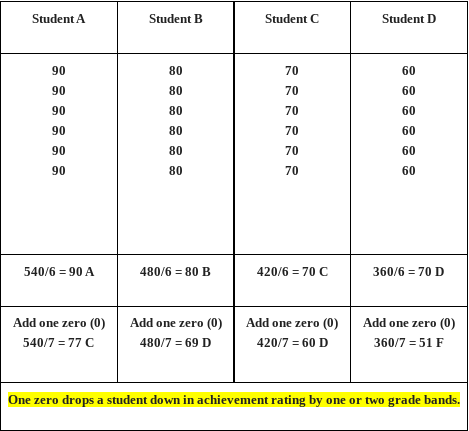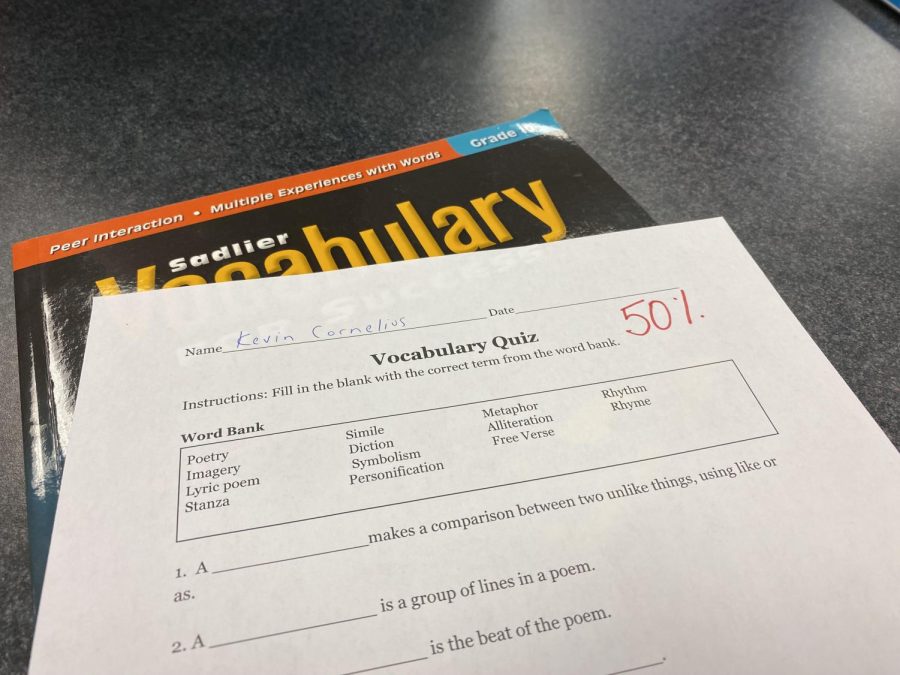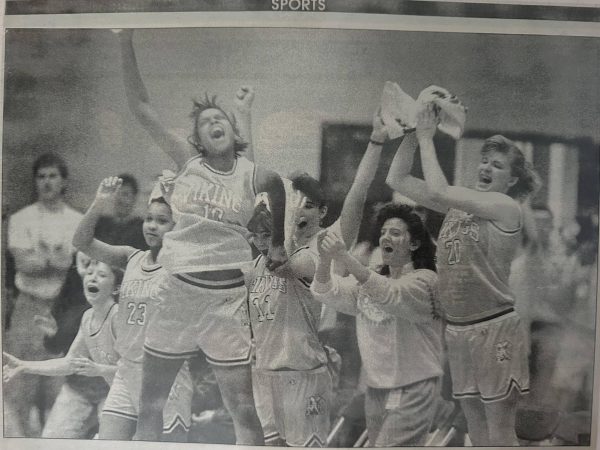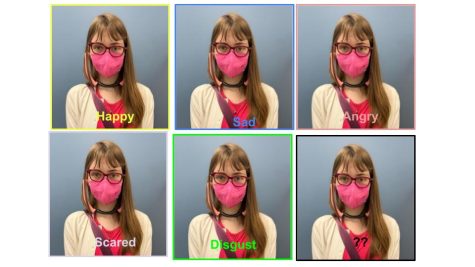“A slap to the face”: Teachers resist proposed FCPS grading policy
An example of a student assignment with only the name written. If the new FCPS policy were to pass, students could do this and receive half credit.
January 10, 2023
Imagine studying for hours on end for the biggest test of the semester. The test begins, and you immediately start scribbling down your answers. The time ticks down and students turn in their tests until one student is left.
The student sits quietly at their seat, only writing their name at the top of the paper. When the tests are graded, you find out that the student who put in no effort received the same score as you, someone who spent lots of time preparing.
Frederick County Public Schools (FCPS) is planning to change their high school grading policies in the near future, and classrooms around the county may soon reflect this hypothetical scenario.
The policy could be implemented within the next couple school years.
Under Policies and Regulations on the FCPS website, Regulation 500-5 states, “As FCPS transitions to a standards-based teaching, learning, and grading system, systemic direction will be provided at each school level to gradually replace the “0” with a “50” as the lowest grade of “F” in subsection G below.”
All middle schools within FCPS are already using the same scale of 50-100 percent.
With the traditional grading policy, teachers begin a lesson or unit, and once all the content is covered, students take a test or quiz and are assigned a summative grade. This grade usually aligns to the percentage of content on which they can demonstrate mastery.
Over the past years, FCPS has been looking at grades across the board. For example, the COVID-19 pandemic in 2020 caused many learning gaps across the county. Students did not achieve the skill mastery they could have with better, in-person instruction.
Consequently, those students advanced to the next grade with the expectation they would have learned content which they might have completely missed.
This situation has led to conversations between staff and the Frederick County Board of Education (BOE). They began to question if all students had an adequate understanding of all the content they are “supposed to know.”
When making decisions such as a grading policy change, all regulations are reviewed and approved by the FCPS Superintendent’s Advisory Committee (SAC). The SAC includes the superintendent; multiple central office staff, including department heads; principal representatives; representatives of each union group in FCPS and community representation.
Dr. Jamie Aliveto is the Executive Director of System Accountability and School Administration for FCPS. She expressed that after middle schools transitioned to the new grading system around the decline of the 2020 pandemic, she knows of many middle school teachers that would reportedly “never go back” to their old way of grading.
“They [middle school teachers] understand the research and believe [it’s] best for kids,” said Aliveto.
Aliveto explained that giving a student a zero makes it virtually impossible for them to recover from such a low grade.
“Mathematically, receiving a 0 out of 100 is a punishment that can last well beyond missing one assignment,” said Aliveto.
Thomas R. Guskey is an education professor at the University of Kentucky and he sides with the BOE in regards to this proposed change.
“[The zero is] such an extreme score in a percentage grading system … To recover from that single zero, a kid would have to get at least nine perfect papers,” said Guskey.
Guskey tested this new grading system in multiple schools throughout Kentucky, and it seemed to be successful.
For the past few years, FCPS middle schools have put this new grading policy into effect.
There is still conflict over giving a 50 percent as the lowest score, especially for students that put little-to-no effort into the assignments they are given.
Dr. Michael Dillman, principal of Linganore High School (LHS), expressed that not all students learn in the same way and needing assistance along the way in the learning process can look different for everyone.
Dillman believes that with the amount of content that students may have missed during virtual and hybrid learning, there should be multiple different ways for everyone to be assisted to achieve the same end result, which he thinks the new policy will help with.
As FCPS transitions to this new change within high schools, the BOE is trying to move away from zero percent as the lowest grade assigned. This decision will be debated by the newly-elected BOE members.
The election for new members of the FCPS Board of Education took place in November, and they were sworn in and took office in December. In an upcoming meeting, the BOE will discuss what policies and regulations they want to enact in the new school year.
FCPS policies are reviewed each year, so a potential change is possible.
Superintendent Dr. Cheryl Dyson expressed that this change is intended to create an overall improvement in students’ learning.
“A zero takes away from providing clear information regarding what the student has learned due to the disparities. The goal is that grades accurately reflect learned material and are not negatively impacted by grading scales. The grade system should teach students that grades should accurately reflect the learning, not compliance or other negative effects of grading practices,” said Dyson.

Dyson explained that when zeroes are still given when grading assignments, the grading impact can be negative for the student. When making decisions like these, the BOE must consider their intended goal for grades.
Dyson gave some examples of the questions that are considered when making this change.
“Are grades demonstrating understanding of the material learned or compliance? Do grades reflect academic proficiency or incorporate rewards for effort and punishment for not submitting evidence of learning?” said Dyson.
If and when this change is made, students will still be responsible for their work but will be automatically given a 50 percent if work is not submitted.
This is not the first time the issue has been raised about changing or deleting grades. Around 2003, the Board of Education voted to get rid of the D letter grade. At the start of the school year, students could not receive a D unless all assignments were avoided completely.
This change did not last long and was overturned after two to three months.
This new policy change is attempting to provide support for the students that need it. However, it will most definitely impact the way student work and assessments are graded and how classes are set up.
“I think our staff is very supportive, and if students are working hard, it shouldn’t be an issue. You have to work harder to get a lower grade like ignoring things and not doing your work,” said Dillman.
Despite being embraced by members of the FCPS leadership team and Linganore High School administration, Linganore students have opposing opinions about this potential change in the grading system at the high school level. Some are happy that they no longer need to put in as much effort, while other students are upset that the hard work they always put into their work will no longer be appreciated.
Sophomore Cara Morgan is one of the students frustrated about this change. She expressed that the policy change is unfair and negatively affects students who put maximum effort into their work.
“Students who don’t work hard should get the grade they deserve based on how much effort they actually put in,” said Morgan.
Sophomore Heather Burdette has a different outlook on the policy change. She thinks that this change has an opportunity to benefit struggling students.
“I feel like it will be convenient for students that often struggle with school. This change could help students get their grade up way easier than it is at the moment,” said Burdette.
Wholeheartedly, it is also just a slap in the face to us teachers. It is telling us [that] somehow we have to figure out how to grade students adequately,
— Damon Norko
Burdette thinks this will cause students to have a better outlook on school and the assignments that come with it. She believes the policy will bring a more stress-free environment to FCPS.
“Coming from my perspective, I think it will be less stressful for me, so I don’t have to worry about my grade dropping below 50%. If I want to raise my grade, it will be so much simpler and quicker,” said Burdette.
But students are not the only ones affected by this change– teachers are becoming more frustrated with this change and believe it is not the right decision.
English teacher Mary Troxel dislikes this possible change and expressed that this policy is the reason she left her previous middle school.
“I do not think this is going to influence students in a positive way at all. The way it will influence people will be to make them lazier,” said Troxel.
Another English teacher, Damon Norko, believes that the BOE does not understand how the environment in school actually works, and he would never fail a student that puts in effort. He thinks this change is completely unnecessary.
“A student putting in effort will pass my class, regardless of their grade; it doesn’t matter. I will make sure they pass because that is the kind of teacher I am,” said Norko.
Norko also expressed that he finds this policy change an insult to teachers.
“Wholeheartedly, it is also just a slap in the face to us teachers. It is telling us [that] somehow we have to figure out how to grade students adequately,” said Norko.
English teachers in the school system are not the only ones having a negative view on this policy. Math teacher Therese Klein is troubled by this change, especially in the math department.
“I think that the policy will not accurately reflect how much [students] know, but rather if they just turn in a paper or not,” said Klein.
Klein explained that without accurate reflections of what students have actually learned, the 50 percent is showing that students know 50 percent of the work.
She believes that “later down the road” when students need to know the topic, especially in math when most topics build off of each other, students will be struggling and it will be damaging to them.
FCPS has not made any permanent changes to the grading system. Follow @LHSJournalism on all social media to get updates regarding this issue.















